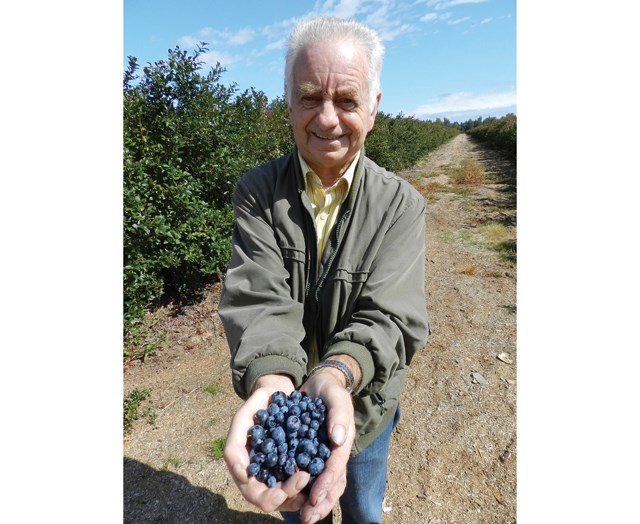A bumper growing season is leaving some Richmond farmers feeling pretty “blue.”
The reason?
According to John Gaskin, who has farmed blueberries locally for the past six decades, there is glut of blueberries flooding the market, leaving some local fields partially unpicked this summer.
It’s simply a case of too many acres across the Lower Mainland dedicated to blueberries and not enough demand, said Gaskin, who has retired but leases out his five-acre blueberry-producing property in the No. 4 and Francis roads area to Birak Berry Farm.
“About a quarter of my property hasn’t been picked and the season is getting late now,” said Gaskin who fears the overabundance of blueberry producers — especially of the smaller berry variety like his — coupled with a good year for the crop, has helped create an oversupply.
“I really fear for the future,” said Gaskin, 77, whose family were pioneers in the local blueberry growing industry. “I’m not sure what’s going to happen. Maybe much of the land in Richmond growing blueberries, mainly those producing the smaller berries, should be changed to another crop.”
What would be planted in their place?
Gaskin wasn’t sure.
“What I do know is that this situation really can’t continue, especially when there are farmers out there planting new fields with blueberries,” he said.
Gaskin explained the smaller blueberry varieties — Weymouth and Junes — are not as much in demand anymore.
“People today want the bigger berries like the Blue Crop,” he said. “If I was a younger man, I’d seriously think of tearing out these (old) plants. Most of these bushes are ones I planted when I was a kid.”
Gurpal Birak, who farms Gaskin’s five-acre property as part of his 350 acre blueberry operations in Richmond, Delta, Surrey and Langley, said prices have been so depressed this year because of the bumper crop it has made no sense to pick some fields.
“Normally, we can get $1.40 to $1.50 a pound for fresh fruit,” said Birak who’s has been in the business 30 years. “This year, the processors are offering 99 to 90 cents, and it costs me around 60 cents to hire pickers.”
Even the blueberry juice market is not offering good enough prices, he added.
“We have been told to expect about 15 cents a pound when normally we’d get around 50 cents,” he said.
Thankful he did not get into the local blueberry business is Bill Zylmans, who runs W&A Farms in east Richmond and serves as chair of the city’s agricultural committee.
“A lot of people told me that blueberries was a retirement crop – they were all picked by machines,” Zylmans said.
“But now, I’m kinda glad I didn’t get into it because they’ve pretty much painted the area from Richmond to Hope blue with the amount of agricultural land producing blueberries.”
But Jason Smith, chair of the B.C Blueberry Council, said he’s not heard of Richmond growers letting their crops go unpicked and would not characterize this year’s yield as creating a glut of blueberries on the market.
While he acknowledged there has been a large expansion in the number of acres turned over to blueberries in the past decade or so in the Lower Mainland — as well as South America and Mexico, which produce berries in the off season amid efforts to grow blueberries year round — Smith said there is still optimism for growers.
Some of that is thanks to efforts such as the recent signing of as memorandum of understanding between China and B.C. to open up export of the fruit to markets there.
“Places like China, India and even the European Union, those represent a lot of customers,” said Smith, whose organization represents about 800 growers who tend to roughly 11,331 hectares (28,000 acres) of blueberry-producing farmland stretching from Richmond to Agassiz.
But he advised that farmers contemplating entering the industry today have to come armed with a well thought out business plan if they hope to succeed.
“Before they plant their blueberry plants, they have to develop relationships with the processors and packers,” Smith said, “because they have to make sure they have a home for their berries long before they start.”
That’s a good rule of thumb for any business venture, said Mark Sweeney, berry industry specialist with the B.C. Ministry of Agriculture.
Sweeney said that data so far from this year’s crop show there was an increase in volume, which the industry has, so far, managed to handle. “More than usual has gone into processing (frozen and juice) than fresh as a result,” he said, adding there could well have been some growers, especially those with older varieties such as in Richmond — which has roughly 492 hectares of blueberries (1,230 acres) — finding some challenges in getting buyers.
Still, there is reason for optimism for future harvests as new markets in North America and Asia are anticipated to develop.
Sweeney added that, in the past decade, the amount of land growing blueberries in B.C. has quadrupled, much of it on the rich antioxidant properties that have been linked with fighting cancer and even improving vision.



